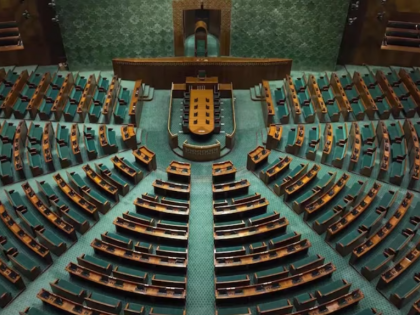Make adultery a crime, says Parl panel
By Lokmat English Desk | Updated: October 25, 2023 12:08 IST2023-10-25T11:44:53+5:302023-10-25T12:08:33+5:30
The parliamentary committee assessing a bill to modernize India's penal code proposes a gender-neutral adultery provision and criminalization of ...

Make adultery a crime, says Parl panel
The parliamentary committee assessing a bill to modernize India's penal code proposes a gender-neutral adultery provision and criminalization of non-consensual sex, including acts of bestiality. Additionally, clearer definitions for community service and life imprisonment are recommended. While non-binding, the report, once completed, will be submitted to the Union home ministry, aiming to revamp India's criminal justice system.
A parliamentary committee suggests the government should make adultery laws gender-neutral and criminalize non-consensual sex for everyone, including transpersons, along with acts of bestiality. This recommendation comes in the review of a significant bill replacing the outdated Indian Penal Code, according to Hindustan Times.
The parliamentary committee on home affairs will propose clearer definitions for terms like community service and life imprisonment. Additionally, it may dismiss concerns about the bill's name, Bharatiya Nyaya Sanhita (BNS), and strongly support the crucial revamp of India’s legal system.
After finalization, the report will be forwarded to the Union home ministry. Although not binding, it holds persuasive influence, particularly because the government willingly submitted the bill for parliamentary review, led by Bharatiya Janata Party's Brij Lal. The panel discussed Section 497 of IPC, which penalized adultery, and highlighted its 2018 dismissal by the Supreme Court, deeming it outdated and unconstitutional.
The panel perceived the law as unfairly targeting married men, imposing up to five years of imprisonment, a fine, or both, for consensual relations with another man's wife without husband consent.
Consequently, as per Hindustan Times, the preliminary panel report is expected to propose making the provision gender-neutral. The committee emphasized the sanctity of marriage in India and believed it should be protected.
Section 377, an outdated British-era law criminalizing homosexuality, was also addressed. The committee observed that even after the Supreme Court's 2018 ruling, certain aspects of the law still applied to cases of non-consensual sex. However, with the exclusion of any reference to Section 377 in BNS, there was no provision for addressing non-consensual sexual offences involving "men, women, transpersons, and acts of bestiality".
The panel is likely to advise the inclusion of Section 377 of IPC.
The Bharatiya Nyaya Sanhita (BNS) is one of three bills presented by Union home minister Amit Shah during the monsoon session in the Lok Sabha. These bills, including Bharatiya Nagarik Suraksha Sanhita, 2023, and Bharatiya Sakshya Bill, 2023, aim to replace the outdated British-era IPC, Code of Criminal Procedure (CrPC), and the Indian Evidence Act, heralding a significant transformation in India's criminal justice system. The draft codes were crafted by a panel of experts, also known as the Committee for Reforms in Criminal Laws, appointed by the home ministry, commencing their work in 2020. They provided comprehensive recommendations to the government, which in turn sought input from states and other experts in this process.
The Indian Penal Code (IPC), governing a wide range of criminal offences, was established by the British in 1860. Post-independence, the Indian government has made approximately 77 amendments to it.
Regarding the death penalty, under the Bharatiya Nyaya Sanhita (BNS), 15 offenses could potentially warrant capital punishment, an increase from the 11 specified in the IPC.
The committee is anticipated to highlight some favourable aspects of the new draft code. This includes the elimination of Section 124A of the IPC. When the Bharatiya Nyaya Sanhita (BNS) was introduced, experts noted the introduction of a new Section 150, aimed at handling "secession," "armed rebellion," "subversive activities," and acts dangering India's sovereignty, unity, and integrity. Offenders can face either life imprisonment or imprisonment for up to seven years along with a fine.
The next panel meeting is scheduled for October 27, during which the report is expected to be submitted. Deliberations on the three laws commenced in mid-August.
Open in app